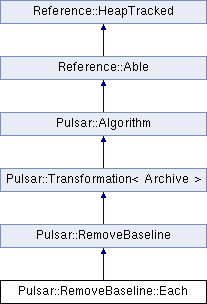 PSRCHIVE
PSRCHIVE
| Ask a Question | Search PSRCHIVE: |
 PSRCHIVE
PSRCHIVE
| Ask a Question | Search PSRCHIVE: |
 Home Home
|
Pulsar::RemoveBaseline::Each Class Reference Find the baseline from each total intensity profile. More...
Inheritance diagram for Pulsar::RemoveBaseline::Each:

Detailed DescriptionFind the baseline from each total intensity profile. This algorithm does not assume anything about the timing model or the dispersion measure. The baseline is separately determined for each sub-integration and frequency channel. Member Function Documentation◆ transform()
Remove the baseline. Implements Pulsar::Transformation< Archive >. References Pulsar::Profile::get(), Pulsar::get_Profile(), Pulsar::MoreProfiles::get_Profile(), Pulsar::MoreProfiles::get_size(), and Pulsar::Index::set_integrate(). The documentation for this class was generated from the following files:
Generated using doxygen 1.14.0
|
||||||||||||||||||||||||||||||||||||||||||||||||||||||||||||||||||